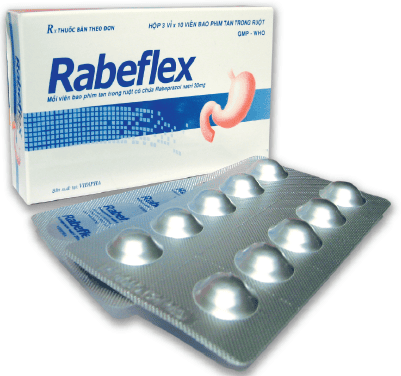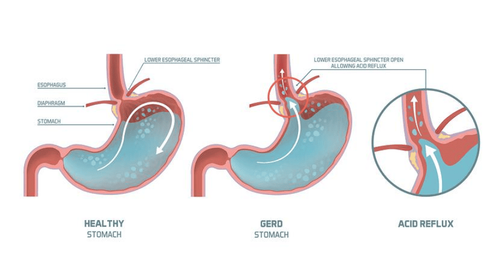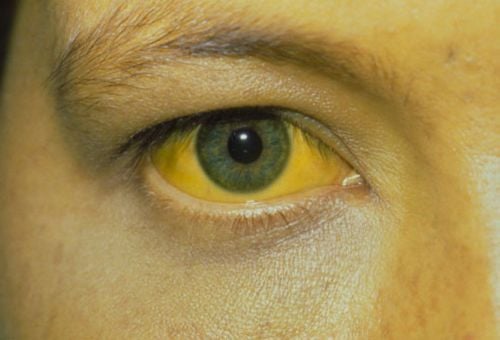This is an automatically translated article.
Esophageal motility disorders are complex and include many factors. This is considered a gastrointestinal lesion in 30% of the population. Patients suffer a lot of difficulties and affect their quality of life.
1. Common symptoms of esophageal motility disorders
Difficulty swallowing : Usually both with liquids and solids. Difficulty swallowing is usually behind the sternum and then spreads to the pharynx. Reflux starts slowly and increases gradually. This phenomenon occurs after eating (early reflux), late reflux when eating greasy foods a few hours after eating. Some other symptoms that may be encountered are unexplained weight loss, hiccups, heartburn, chest pain, reflux pneumonia.

Một số triệu chứng thường gặp của bệnh rối loạn vận động thực quản như khó nuốt, trào ngược, ợ chua,...
2. Esophageal motility disorders
Cardiac spasm, diffuse esophageal spasm, and gastroesophageal reflux are a subset of the activities of esophageal motility disorders.
Cardiac spasm: This is a motor neuron disorder. First, the esophageal muscle does not work, so it cannot relax, leading to a lot of pain when swallowing food or drinking water. After the disease has progressed, the esophagus gradually expands, pain is reduced but dysphagia increases. The main treatment is using balloon esophageal dilatation or LES opening surgery and esophageal sphincterotomy. Drugs that relax the lower esophageal muscle are used only in the early stages: Metoclopramide (brand name primperan, anausin) 10mg tablet; Domperidone (brand name motilium, peridy) 10mg tablets, 1mg/ml oral suspension, 10 and 30mg suppositories; Sulpiride (brand name Dogmatil) 50mg tablets; Metopimazin (brand name Vogalen) sugar coated tablets 2.5mg, drops 0.1mg/drop, suppositories 5mg, injection 10mg/1ml; Alizaprid (Plitican); 5 HT3 receptor antagonists (anzemet, zophren). Diffuse esophagitis: Presented as angina but less often than cardiac spasm. Caused by the loss of coordination of muscle movement, only the peristalsis of the lower esophageal muscle layer remains. This condition can occur at any age but is most common in people 20 to 60 years old. Onset is often asymptomatic and progresses gradually over months or years. Gastroesophageal reflux: The patient feels a burning sensation in the epigastrium, spreading to the back of the sternum, sometimes up the throat. Sometimes there is also belching, heartburn, hoarseness, sore throat. The cause is still unknown, but much is said about the role of the lower esophageal sphincter. Certain factors that weaken or relax muscles contribute to GERD, such as: Drinking alcohol, smoking, coffee, chocolate, spicy and fatty foods, medical conditions such as obesity obesity, diabetes in pregnant women, diaphragmatic hernia...
3. Difficulty swallowing
Dysphagia is a disease of the esophagus, making it difficult to perform swallowing activities. This phenomenon is classified into oropharyngeal and esophageal.
Difficulty swallowing oropharyngeal dysphagia Oral - pharyngeal dysphagia is a condition in which it is difficult to move food from the mouth - pharynx to the esophagus, caused by functional disorders in the upper esophagus. Patients often find it difficult to swallow, or have nasal and tracheal aspiration accompanied by coughing.
Usually, oropharyngeal dysphagia occurs in patients with muscular or neurological disorders affecting striated muscles. Neurologically, some diseases such as stroke, Parkinson's disease, multiple sclerosis, medullary palsy, giant cell arteritis also cause dysphagia. Myasthenia gravis, dermatomyositis, muscular dystrophy, and cricopharyngeal ataxia also cause dysphagia.

Khó nuốt miệng-hầu xảy ra ở những bệnh nhân có rối loạn vận động thực quản, ảnh hưởng đến cơ vân
Esophageal dysphagia Esophageal dysphagia is difficulty moving food down through the esophagus to the stomach. It is mainly caused by movement disorders or mechanical obstruction. The common movement disorders are cardiac spasm, diffuse esophageal spasm, systemic scleroderma, eosinophilic esophagitis. The cause of mechanical obstruction may be due to esophageal stricture. Esophageal cancer, lower esophageal sphincter, esophageal mesh, radiation stenosis, erosive swallowing.
In summary, esophageal motility disorder is a form of gastrointestinal tract injury, which greatly affects the daily life of patients. Therefore, when experiencing any of the symptoms mentioned above, you should immediately go to a medical facility for timely examination and treatment.
Please dial HOTLINE for more information or register for an appointment HERE. Download MyVinmec app to make appointments faster and to manage your bookings easily.













